The 22nd Taipei Arts Festival (臺北藝術節) opens tonight with three productions, a slightly scaled-down pandemic version that seeks to keep its tradition of big ideas, challenging programs and international connections alive and moving forward in an increasingly uncertain world.
The theme of this year’s festival is “Super@#S%?” — as good a term as any when descriptives and superlatives seem not only inadequate, but somewhat irrelevant in a world where so many people cannot imagine being able to return to theaters, either as performers or audience members — they are too worried about having a job and their health.
Technically, however, it is meant represent humans pursuit for the “super” amid the COVID-19 pandemic.
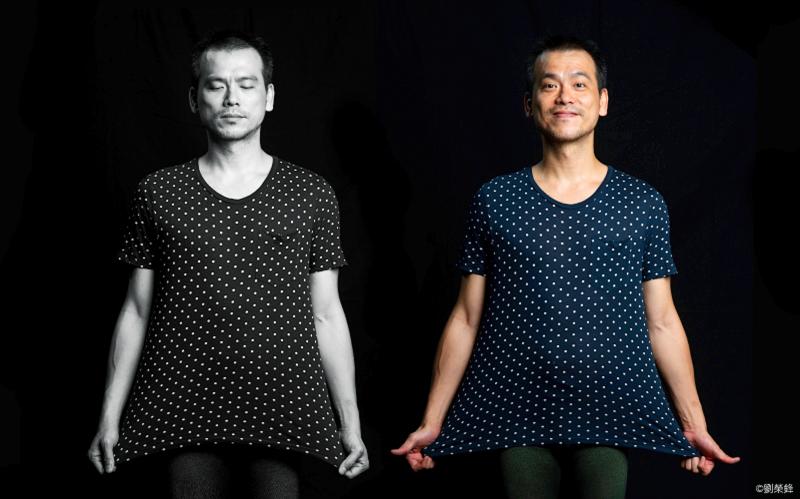
Photo courtesy of Taipei Arts Festival
For a man whose carefully deliberated festival program went to hell six months ago, and who has three premieres to oversee this weekend, Singaporean Tang Fu-kuen (鄧富權) looked surprisingly relaxed yesterday as we met for a chat in the Fortress Cafe at Taipei’s Zhongshan Hall.
“It’s going to be a really crazy weekend, three shows,” he said, as he plotted how he was going to see Dances for Wu-Kang Chen (攏是為著‧陳武康) at the hall, CosmicWander: OnGon+NeZha at the Shuiyuan Theater and Sun Moon Lake is a Concrete Box (日月潭是一個水泥盒) at the Taipei Backstage Pool.
PERFECT METAPHOR
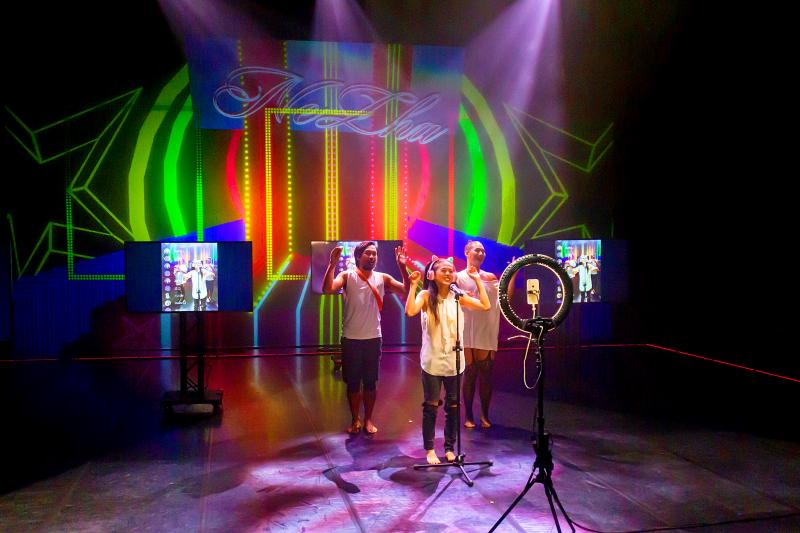
Photo courtesy of Taipei Arts Festival
Considering all the trouble and angst Tang and his team have had to go through to reach this weekend, it seems apt that they — and the performers and audience — have to go through a sewage plant to get to the pool studio for that third program by Taiwanese artist Xia Lin (林亭君), and Canadians Sheryl Cheung (張欣) and Liam Morgan, as well as two later Think Bar (共想吧) productions.
“Even though our offices are right above the plant, we had never been there before,” Tang said.
The pool area only holds 60 people, and admission is free, albeit with advance registration, so all three productions there are already booked. For some of the other shows in regular theaters, there are still tickets to move.
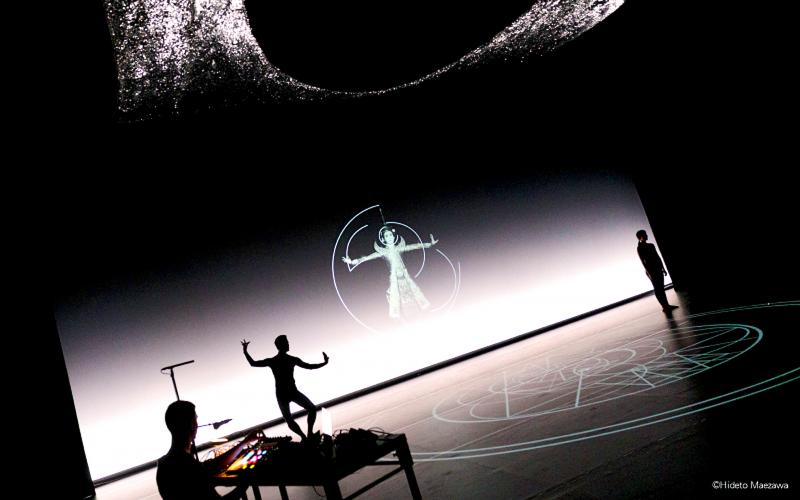
Photo courtesy of Hideto Maezawa
“So far the box office is doing alright now, a show taking 500 to 600 is the ceiling,” Tang said, noting that it was only about a week before the tickets went on sale that the government eased its restrictions on the number of people allowed in theaters.
“If we could pack in 500, that would be great,” Tang said.
The festival is about 20 percent smaller than last year’s, 13 productions over seven weeks, compared with 16, and the number of performances has also been scaled down, but as Tang stressed: “They are all premieres.”
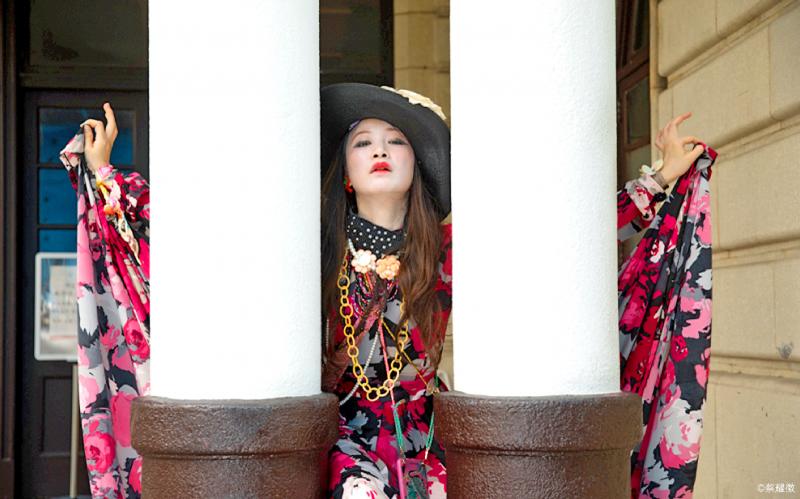
Photo courtesy of Taipei Arts Festival
The festival has been divided into three parts: the Pandemic Program (疫起策畫), the Main Program (核心節目) and the Think Bar, one of the innovations that Tang introduced when he took over as curator three years ago.
“By March, when we had to overhaul the program, I chose five performances, and framed the theme as pandemic response,” Tang said.
Some of the planned shows by foreign companies were canceled early on in response to the spread of COVID-19. For other artists, local and foreign, Tang said he laid out three conditions.
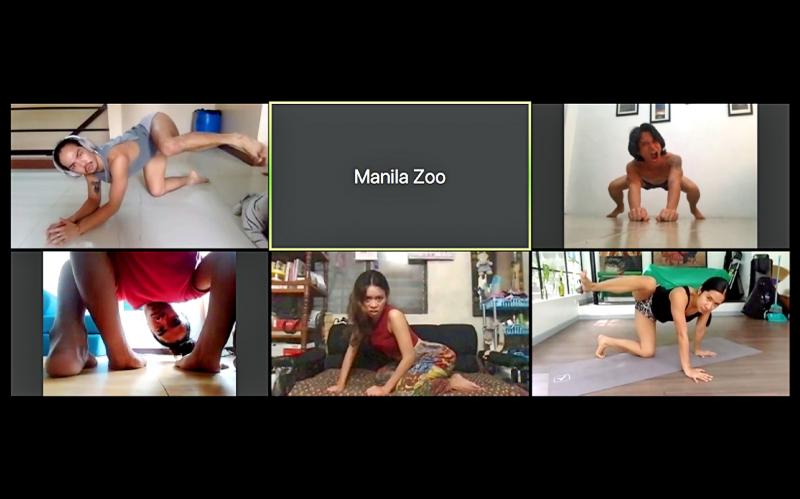
Photo courtesy of Taipei Arts Festival
The first, for foreigners was: “Would you accept a 14-day quarantine… That’s the basic condition, it’s fundamental. Several said no,” Tang said, noting that most would also face being quarantined again once they returned home, so that meant at least one month’s commitment all told.
The second was would they consider doing an original work — adapting, adjusting or reformatting what they had planned to do “to speak to the current condition,” which led more to drop out.
The third condition was really for the production team — to take those that were left and formulate new projects with them, commission new works, Tang said.
TOTAL CREATION FESTIVAL
“We can’t simply go online… Taiwan is the only platform this summer and at full capacity,” he said. “We have to capitalize on the ability to use theaters, live performances.”
That does not mean that the festival has ignored the possibilities of modern media and digital technology, with Filipino choreographer Eisa Jocson making her third appearance at the festival via Zoom for Manila Zoo.
For The Past is a Foreign Country, Chinese-Austrian artist Jun Yang (楊俊) has been able to make it to Taipei, but his partner, Japanese choreographer/performance artist Michikazu Matsune, got stuck in Vienna, so they have had to adapt their show by integrating technology.
Tang said the festival, and pandemic, are a test.
“If you are truly a contemporary being, and artist, you will be willing to take up these conditions. It is not about building a bubble space,” he said.
That idea led him to musing about the luxury of being able to present foreign artists and companies in Taiwan, or for Taiwanese artists to perform abroad, whether this will become a rarity or a thing of the past.
“Audiences have not yet realized what a privilege it is that some artists are still willing to come to Taiwan, to realize that a visiting artist means a lot of sacrifice … in time, quarantine and the costs — the [COVID-19] tests are expensive and so are the quarantine hotels,” he said.
But he said people have to keep responding to changing conditions to remain optimistic.
“It’s not all gloom and doom, there must be an alertness and nimbleness to respond effectively” he said.
BEL AND WU-KANG
One artist who had already begun preparing for a new era in creativity and productions is French choreographer Jerome Bel, who decided a year ago to stop traveling by air for environmental reasons, both for himself and his company.
For last year’s festival, he worked, via Skype with an all local cast and codirectors Yeh Ming-hwa (葉名樺) and Chen, dancer/choreographers who also happened to be husband and wife.
However, he had also begun trying to compose solos for individual dancers that he would not meet in person during the creative process, just online.
The pandemic — and the Taipei festival — created the perfect opportunity for him to test his theories, and he said Chen was the perfect person to work with because he is “both skillful and open to new experience.”
The process was “totally new for me and for him, he didn’t know if it was going to work, he doesn’t know yet,” Chen said in a telephone interview last week.
The 70-minute Dances for Wu-Kang Chen is a combination of dance history, an autobiography and a retrospective of some of Bel’s works.
“It’s like a CD, a collection of songs, but each song is from a time of work and my history,” Chen said.
He said working long distance was strange, but not as bad as he anticipated.
“I thought I would miss his [Bel’s] eye, but with or without him the practice is very effective … I can feel the energy,” Chen said. “He has everything planned out.”
Not really. Both Chen and Tang said Bel is much more flexible this time around.
The autobiography part in the middle is about 20 minutes and Chen said Bel spent a long time editing it — and asking him a lot of questions about the decisions he has made in his career.
There was also a lot of homework.
“For Isadora Duncan [Bel’s dance that premiered last year] — he gave me four pieces of her work. I only knew that she took shoes off and how she died. Learning her history and background was really interesting: She observed, like a scientist, every movement was a sentence to describe, like poetry,” Chen said.
Chen said working with Bel made him realize that you cannot always predict what will happen.
“You find a certain place, find a door, sometime it opens and there is nothing there, sometimes there is a lot. You cannot predict the path,” he said.
SHAMANISM
While Chen will be onstage in Zhongshan Hall’s Zhongzheng Auditorium, across the city, Berlin-based Singaporean artist Choy Ka-fai (徐家輝) and his team will be presenting CosmicWander: OnGon+NeZha at the Shuiyuan Theater, an exploration of the alternative realities that exist in and in parallel to this world.
Choy spent 18 months traveling around Taiwan and Siberia, meeting more than 50 mediums and filming their rituals.
CosmicWander: Nezha looks at the playful boy-deity who still plays a major role in Taiwan today, while CosmicWander: OnGon examines Siberian shamans’ embodiment of OnGon.
While the festival is just starting this weekend, several of the shows are already sold out or booked-up if they are free, including: The Grandmother Paradox (祖母悖論); Disappearing Island (消逝之島) and Is(o)Land Bar: Single Take (Cloudy) (島嶼酒吧: 如果雲知道 (無碼)).
However, there are still seats available for the Pichet Klunchun Dance Company’s No. 60 next weekend at the Shuiyuan Theater; and an usual magic show, Transhumanism: A Fair (新人類計劃: 園遊會) and The Library Tapes (圖書室錄音).
More information about the shows and the venues is available in English and Mandarin on the festival’s Web site (www.artsfestival.taipei).
Performance Notes
WHAT: Dances for Wu-Kang Chen
WHEN: Tonight and tomorrow at 7:30pm
WHERE: Zhongshan Hall (台北市中山堂), 98 Yanping S Rd, Taipei City (台北市延平南路98號)
ADMISSION: NT$600 and NT$800; tickets available at NTCH box offices, Eslite ticket desks, online at www.artsticket.com.tw and convenience store ticket kiosks
ON THE NET: www.artsfestival.taipei
WHAT: CosmicWander: OnGon+NeZha
WHEN: Tonight and tomorrow at 7:30pm, Sunday at 2:30pm
WHERE: Taipei City Shuiyuan (Wellspring) Theater (台北市水源劇場), 92 Roosevelt Rd Sec 4, Taipei City (台北市羅斯福路四段92號)
ADMISSION: NT$900. Available at NTCH box offices, Eslite ticket desks, online at www.artsticket.com.tw and convenience store ticket kiosks

The primaries for this year’s nine-in-one local elections in November began early in this election cycle, starting last autumn. The local press has been full of tales of intrigue, betrayal, infighting and drama going back to the summer of 2024. This is not widely covered in the English-language press, and the nine-in-one elections are not well understood. The nine-in-one elections refer to the nine levels of local governments that go to the ballot, from the neighborhood and village borough chief level on up to the city mayor and county commissioner level. The main focus is on the 22 special municipality

In the 2010s, the Communist Party of China (CCP) began cracking down on Christian churches. Media reports said at the time that various versions of Protestant Christianity were likely the fastest growing religions in the People’s Republic of China (PRC). The crackdown was part of a campaign that in turn was part of a larger movement to bring religion under party control. For the Protestant churches, “the government’s aim has been to force all churches into the state-controlled organization,” according to a 2023 article in Christianity Today. That piece was centered on Wang Yi (王怡), the fiery, charismatic pastor of the

Hsu Pu-liao (許不了) never lived to see the premiere of his most successful film, The Clown and the Swan (小丑與天鵝, 1985). The movie, which starred Hsu, the “Taiwanese Charlie Chaplin,” outgrossed Jackie Chan’s Heart of Dragon (龍的心), earning NT$9.2 million at the local box office. Forty years after its premiere, the film has become the Taiwan Film and Audiovisual Institute’s (TFAI) 100th restoration. “It is the only one of Hsu’s films whose original negative survived,” says director Kevin Chu (朱延平), one of Taiwan’s most commercially successful

Jan. 12 to Jan. 18 At the start of an Indigenous heritage tour of Beitou District (北投) in Taipei, I was handed a sheet of paper titled Ritual Song for the Various Peoples of Tamsui (淡水各社祭祀歌). The lyrics were in Chinese with no literal meaning, accompanied by romanized pronunciation that sounded closer to Hoklo (commonly known as Taiwanese) than any Indigenous language. The translation explained that the song offered food and drink to one’s ancestors and wished for a bountiful harvest and deer hunting season. The program moved through sites related to the Ketagalan, a collective term for the